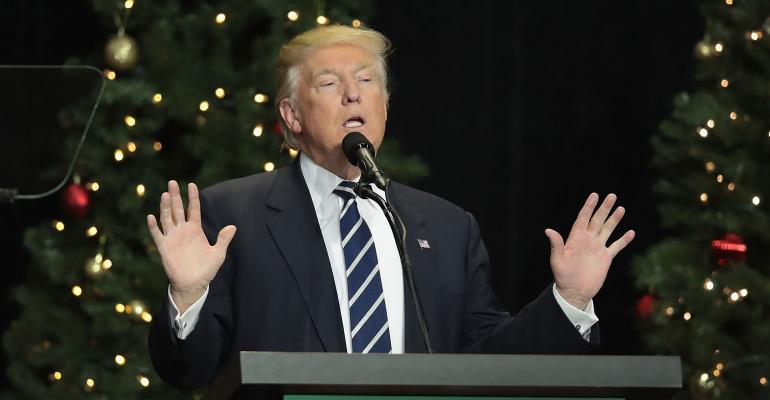Joe Kefauver is managing partner of Align Public Strategies, a full-service public affairs and creative firm that helps corporate brands, governments and nonprofits navigate the outside world and inform their internal decision-making. This article does not necessarily reflect the opinions of the editors or management of Nation’s Restaurant News.
A little over month has passed since Election Day and we are learning more each week about what the Trump administration will look like. Depending on your perspective, he’s given you plenty of ammunition to be either very optimistic or scared to death.
Whenever I try to analyze the incoming administration’s potential impact on entry-level employers, I keep hearing Winston Churchill's famous analysis of Soviet-era socialism rattling around my head — “a riddle wrapped in a mystery inside an enigma.” As many of us parse the cabinet nominations for clues regarding his policy priorities, one of the riddles I find most interesting is what his relationship will be with another enigma, corporate America.
One thing I have concluded so far (plus or minus at least one, “Wow, I didn’t see that coming,” moment) is that while the next two to four years could be a great time for the restaurant and retail industries as a whole, individual companies could easily find themselves in some tough spots. And with an incoming administration that seems to easily alternate between good cop and bad cop, lots of companies could be in for a wild ride.
Trump's experience as a “business guy” seems to be informing his cabinet-level decision-making. The nomination of Andy Puzder for labor secretary sends a clear signal that the activism of Obama's DOL, EEOC, OSHA and the NLRB among other agencies is coming to a screeching halt. Trump’s expertise as a large employer in a labor-intensive industry will certainly bring a much-needed understanding of the pressures facing companies with low profit per employee.
And say goodbye to Obamacare as we know it. The Affordable Care Act should be a case study in demonstrating the woeful ignorance or shameless indifference policy makers display regarding the impact of certain laws on service and retail industries. I believe Mr. Puzder will personally excel at addressing both of those shortcomings.
Additionally, count on Puzder and his team to take a very different approach to regulatory enforcement. The Obama team favored punitive measures for non-compliance over partnering to correct an issue — basically choosing punishment over problem solving. A Trump-inspired and Puzder-led Labor Department will likely strike more of a good cop posture and, much like the Bush Administration, we can expect the agency to work toward compliance.
This all sounds great if you’re in the restaurant, retail, hospitality and other service industries. You’re thinking, “Hey, we’ve got one of our own in office.” Maybe those industries can rejoice a little but individual companies that make up those industries need to be on alert. Hence, the enigma.
This same administration is being populated with immigration and trade hawks who have demonstrated their willingness to call out what they believe are bad actors. If you are a company that utilizes a workforce with lots of foreign-born and potentially undocumented workers, get ready to find yourself on the wrong end of the Trump Administration’s electronic bully pulpit — the one that starts with a 140 character social media rant to 17 million followers and ends with immigration raids, all covered by a willing media. If you are a company that utilizes agricultural products like seafood from Asia or produce from Mexico, get ready. If you are a company that retails products sourced overseas because it’s cheaper than products manufactured domestically, get ready.
It’s entirely possible that business model savings on the good cop side of the administration could be offset abruptly by reputation damage from the bad cop side. In other words, the Trump administration may be business friendly, but the Trump White House and @realDonaldTrump will gladly take a few companies and their CEOs out to the woodshed when they feel the need.
Just ask the Ford Motor Company, Boeing, or Carrier. The president-elect isn't even in office yet and he’s already calling out individual corporate brands for their behavior — or more precisely, the perception of their behavior. He’s feeding the populist wave that got him elected — the millions of people who think big corporations and big governments are morally corrupt and giving them a raw deal. They are hungry for scalps and Trump will be happy to oblige, one Twitter rant at a time. Think it doesn’t matter? Just last week Trump uttered that the Air Force’s F-35 program is bloated. An hour later, Lockheed Martin’s stock price fell four points, taking millions of dollars in shareholder value with it.
So while many corporate leaders are, with good reason, high-fiving in boardrooms across the country, they still need to keep a close eye on their new benefactor who could abruptly knock on their door any given night. Industry leaders need to understand that preparing for that riddle is no joke.





